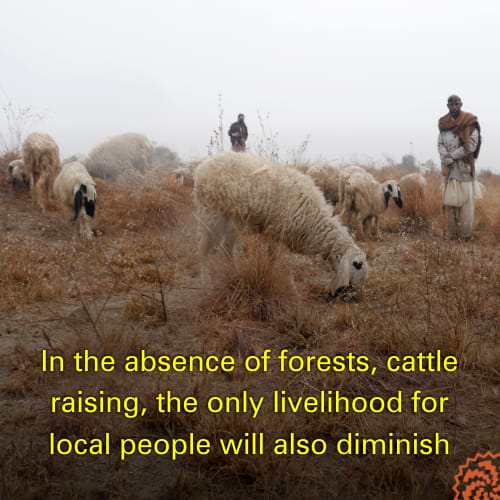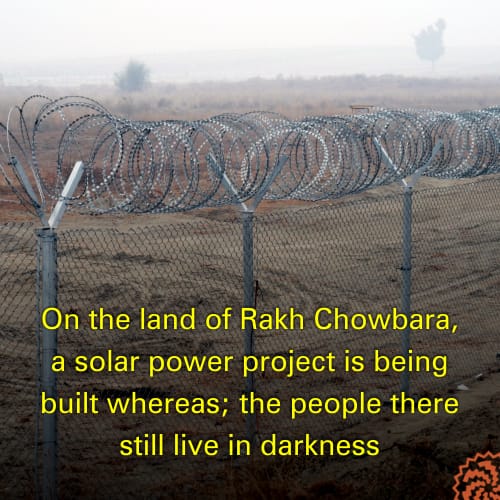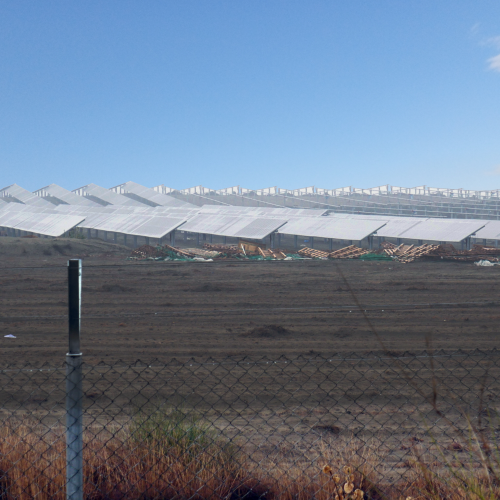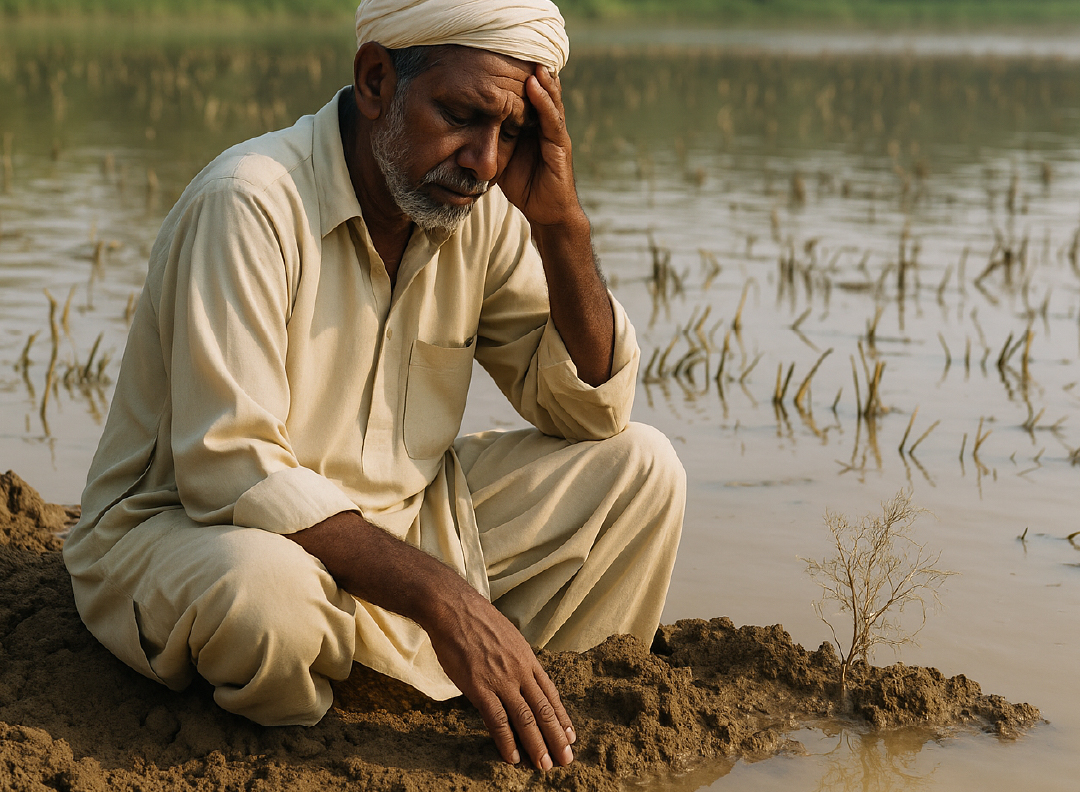In rural Punjab, a new solar energy project promises to bring electricity to thousands of households but threatens livelihoods of villagers who say it is built on land meant for forests and livestock grazing.
Solar energy panels have been installed over a large area of Rakh Chaubara in District Layyah. Officials said the solar energy project, that would be functional soon, would meet the electricity needs of 70,000 households in the area. Spread over an area of 16,926 acres, a large part of Rakh Chaubara falls to the east of a road that connects the Chaubara tehsil headquarters in Layyah district of southwestern Punjab to the Ghar Maharaja town in nearby Jhang district.
The Rakh in the place's name suggests that it was "kept" - Rakh in Punjabi, the dominant local language, means keep - for a specific purpose. Government documents show it as a land reserved for growing a forest.
However, in January 2021, about 650 acres of the Rakh land was leased for 25 years to Zhenfa Pakistan New Energy Limited, a subsidiary Zhenfa Energy Group - a Chinese company - to install a solar power plant. The solar electricity project, now in its final stages, will generate 100 megawatts of electricity.
Just a stone throw from the project's massive solar electricity installations is Malan, a village where dozens of families do not have access to electricity. The few households that do have installed their own solar panels. As dusk falls, most of the village is enveloped in darkness.
Ashiq Hussain, a middle-aged resident of Malana village, does not expect that he would receive electricity from the solar project installed at the Rakh Chaubara. He, however, said the installation spread over many acres had further fuelled poverty in the village.“The solar power plant has been installed over forest land where villagers have grazed their cattle for decades,” Hussain explained.

A majority of families in the largely rural Rakh Chaubara raise cattle for livelihood. Taking away the land that feeds local livestock would have adverse impact upon the rural economy and local families who have no other source of income but cattle farming.
Hussain said that in Malana and other adjacent villages, there was little water available for agriculture which led to low per-acre-yield of crops. “Resultantly, livestock is the most important sector of local economy,” he said.
Besides, he said the locals used to pay the Punjab Forest Department an annual fee of Rs 10 per animal that grazed on government land. Hussain said that the government had issued them grazing permits valid till June 2021. However, the land was given to the Chinese company long before the permits term had expired.
In January 2021, Hussain and several other villagers approached Deputy Collector Layyah, asking that the government give a large tract of unutilized land south of Rakh Chaubara to the Chinese company. That would have kept the grazing ground for the local livestock in the area intact. However, their pleas fell over deaf ears.
During the same month, villagers approached the local court pleading that the government was forcefully evicting them from their grazing lands. He said that when villagers showed grazing permits to the government officials, the enraged officials started threatening the villagers.
The complainants also asked the court to stop work on the project till the resolution of dispute over land.
Meanwhile, the locals and the government officials reached an out-of-court settlement of the dispute. Hussain said the authorities promised drinking water and health facilities to villages if they withdrew their petition. Besides, the authorities also promised to employ local people, who had lost their livelihood due to the project, in the company.
Since this was only a verbal agreement, the authorities did not keep their word.
"Not a single of the promises made to the locals were fulfilled and all the jobs at the company given to people from the Sindh province," he said.
Maqsood Ahmed Basra, Chief Executive of Zhenfa Pakistan New Energy Limited, said the local area lacked a trained and skilled workforce. The jobs in the project that required technical knowhow therefore, he admitted, went to the non-locals.
However, he claimed 90 per cent of jobs not requiring technical skills had gone to the locals.
Might is right
Zhenfa Pakistan New Energy was set up in September 2014. Barely a month into its creation, the Punjab Private Power Development Board (PPPDB) through a letter allowed the company to set up a solar energy park of 100 megawatts.

When Zhenfa Pakistan selected the Rakh Chaubara land for setting up a solar project, the PPPDB wrote a letter to the Deputy Commissioner Layyah on August 6, 2015, informing him about the project. In response to the letter, Assistant Commissioner Chaubara informed the board in September 2015 that the land was the property of the forest department, saying the land could be used to set up a solar project only after the department’s permission.
However, the Deputy Commissioner wrote a letter to the Punjab Board of Revenue, where he took a different stance saying the land belonged to the provincial government from 1940 to 1995 and it was shown as the property of the forest department due to an error in the revenue record.
The Deputy Commissioner said the error had now been rectified.
The official stance was that the provincial government had leased the land to the forest department in 1963 for tree plantations but the original owner, the Punjab Government, had the right to hand over the land to anybody without asking the forest department.
Following this, the Board of Revenue handed over the land to the Zhenfa Pakistan New Energy Limited to see whether it was suitable for setting up a solar power project.
However, Umar Farooq, an official of the forest department in Chaubara, said that the provincial government kept them in the dark about the land transfer. He said that even as they were planting trees on the land, the Punjab government was planning to lease it out for an energy project.
Farooq claimed that the forest department had planted over 20,000 saplings in the area between 2017 and 2020.
Besides, in a letter addressed to the Board of Revenue, a section officer of the forest department pointed out that his department was not informed while the land was being leased to the company.
He noted that not only the administrative control of the department over the land was ignored but also the Forest Act of 1927, under which the land was reserved for growing a forest.
Official maps showing the forest officials' residences and a nursery on the land support the department's claim.
The Layyah based divisional forest officer, Nadeem Ashraf Warriach, also took the same plea in a letter to the Conservator of Forest Range Management Circle, Lahore. He said that Zhenfa Energy had forcibly occupied the forest department land in connivance with the deputy commissioner.
Also Read

Global warming: An international panel of scientists identifies the most lethal threats to life on Earth
“In order to change the use of the land from forest as declared under the Forest Act 1927, the department's permission was necessary," the official said, adding that "the loss resulting from the change of land use should also be compensated.”
In a letter dated January 25, 2021, addressed to the Chief Minister Secretariat, the Deputy Commissioner Layyah had admitted the land had been under the control of the forest department for the past 59 years.
However, at the same time, the official claimed the forest department had not planted even a single tree all these years. He said that the forest department started planting soon after the lease of the land to the company.
The official alleged the plantation was being done to facilitate illegal encroachers using the land for grazing their livestock.
Despite losing its control over the land, the forest department is still clinging to the claim of land ownership. When the solar energy company started cutting trees for installation of solar plates on August 18, 2021, one of the forest guards lodged an FIR against them. Muhammad Ashfaq, the forest guard told police that the company workers cut trees worth Rs 96,000 while ignoring his directions not to do so.
Nadeem Ashraf Chohan also submitted an application to the Civil Judge Chaubara seeking action against two company employees who had felled trees worth Rs 96,000 and Rs 180,000.
However, no legal action has been taken on both applications so far.
Published on 14 Jan 2022



















